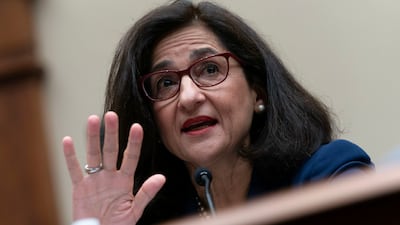Minouche Shafik, the Egyptian-born economist who became the first woman to lead Columbia University, has resigned after months of being under scrutiny for her handling of on-campus Gaza war-related protests.
The National takes a look at her lengthy career and short tenure at the New York Ivy League university.
Who is Minouche Shafik?
Ms Shafik was born in Alexandria and her family left Egypt when Gamal Abdel Nasser began nationalising the country.
She grew up in the southern US, living in Georgia, Florida and North Carolina. She holds British and US citizenship.
In 1993, Ms Shafik graduated from the Massachusetts Institute of Technology in Boston and then earned a master's degree from the University of London and a doctorate from the University of Oxford.
Before leading Columbia, Ms Shafik was the director of the London School of Economics.
Before that, she served as deputy governor of the Bank of England from 2014 to 2017, managing a $605 billion balance sheet.
In 2015, she was given the title of Baroness in the Order of the British Empire.
Throughout her career, she has been involved in public policy and academia with stints at the World Bank, Georgetown University in Washington and the Wharton School of the University of Pennsylvania.
Speaking with Congress
In April, Ms Shafik and the board of trustees members were questioned by members of a House of Representatives committee about on-campus hate and anti-Semitism after the Hamas-led October 7 attack on Israel.
She arrived on Capitol Hill four months after a similar hearing led to the resignations of two Ivy League university presidents.
From the start, Ms Shafik took a more decisive stance than the presidents of Harvard and the University of Pennsylvania, who gave lawyer-like answers when asked whether calls for the genocide of Jews would breach school policies.
Tension on campus increased since she appeared before Congress.
Addressing on-campus protests
Ms Shafik's approach to the student protests included calling NYPD on the encampments twice, requesting a police presence for the end of the school year and cancelling the main graduation ceremony.
Many argue that her decisions fuelled solidarity student protests at colleges and universities across the US and globally.
More than 100 pro-Palestine protesters were arrested for the first time she authorised local police to clear a camp set up by students demonstrating against Israel's war in Gaza and called for university divestment from Israel.
Another student tent camp popped up immediately after and Ms Shafik ordered campus police to limit activities on campus, including remote classes and exams for the end of the academic year.
Involved students were suspended, city and national leaders slammed the school as “out of control” and rumours of a National Guard response swirled.
“Let’s remind ourselves of our common values of honouring learning, mutual respect and kindness that have been the bedrock of Columbia,” Ms Shafik said once in the spring.
“I hope everyone can take a deep breath, show compassion and work together to rebuild the ties that bind us together.”
She had the university and faculty negotiate with the demonstrating students but talks fell apart when leadership refused to discuss divesting from finances connected to Israel and its actions in occupied Palestinian territories.
A small group of students took over an academic building in response. Ms Shafik called the police again to violently clear the building occupation and tent camps.
She requested a NYPD police presence on campus until the academic year concluded, and cancelled the main graduation commencement event, angering many connected to the university.
Stepping down
Debates swirled about Ms Shafik's handling of the protests and the end of the school year.
Criticism of Ms Shafik's response to the campus protests focused on free speech, protest rights, over-policing and the safety of students and faculty in multiple communities of the university.
She had lost the confidence of the faculty of arts and sciences, 20 per cent of Columbia's full-time university staff.
“I write with sadness to tell you that I am stepping down as president of Columbia University, effective August 14, 2024,” Ms Shafik wrote in her resignation letter.
“I have had the honour and privilege to lead this incredible institution, and I believe that – working together – we have made progress in a number of important areas. However, it has also been a period of turmoil where it has been difficult to overcome divergent views across our community.”
Ms Shafik revealed that she will be returning to the UK House of Lords to help with formulating a legislative agenda for the new government there.


